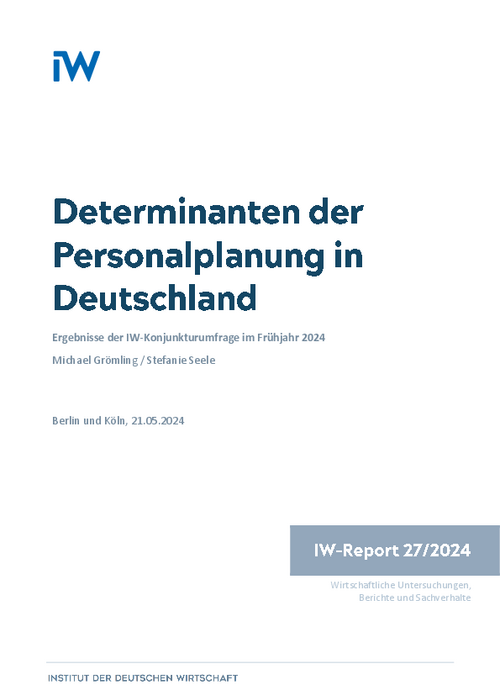The German labor market has been growing since 2005. The dip in the wake of the coronavirus pandemic between 2020 and 2022 is an exception, as the German labor market has reached a record level of 45.9 million people in employment by 2023.

Results of the IW economic survey in spring 2024: Determinants of personnel planning in Germany

The German labor market has been growing since 2005. The dip in the wake of the coronavirus pandemic between 2020 and 2022 is an exception, as the German labor market has reached a record level of 45.9 million people in employment by 2023.
It is worth noting that in 2023, for the first time since reunification, the volume of hours worked has increased during a recession. In Germany, economic adjustments on the labor market have generally been dealt with by adjusting working hours.
The IW economic survey in spring 2024 did not indicate a recovery in the economic situation for the current year (Grömling, 2024). In this IW economic survey, the relevance of ten different supply-, demand- and labor market-determinants for establishments' workforce planning was surveyed. The most recent additional question in the IW economic survey shows that the development of labor costs and the shortage of skilled labor are the relevant determinants for establishments' workforce planning. Regardless of the establishment size, sector and region, supply- and demand-side determinants play a subordinate role.
Labor market reforms are required to dampen the shortage of skilled labor and slow down the evolution of labor cost. "Working more" is the slogan of our time. It should become easier and at the same time much more attractive to work additional hours. Without these reforms, the transition of the baby boomers into retirement will be a decisive factor in the rise of labor costs and further shortage of skilled labor. In Germany, potential for stabilizing the volume of hours worked in the face of demographic change has so far been wasted. More incentives for a longer working life, for higher weekly working hours, for second earners and for more qualified labor migration are required.

Results of the IW economic survey in spring 2024: Determinants of personnel planning in Germany

More on the topic

Orphaned executive chairs in German companies
In 2023, half of the companies in Germany reported increasing problems in filling vacancies for management positions because employees are not aiming for a career. Larger companies are less affected than small companies.
IW
Forms of Employee Participation and Conflict Management in the Workplace
An analysis based on the IW Personnel Panel showed which topics of conflict emerged in the workplace and how these conflicts were resolved. According to this data from 2022 works councils were present in 11 per cent of all companies.
IW